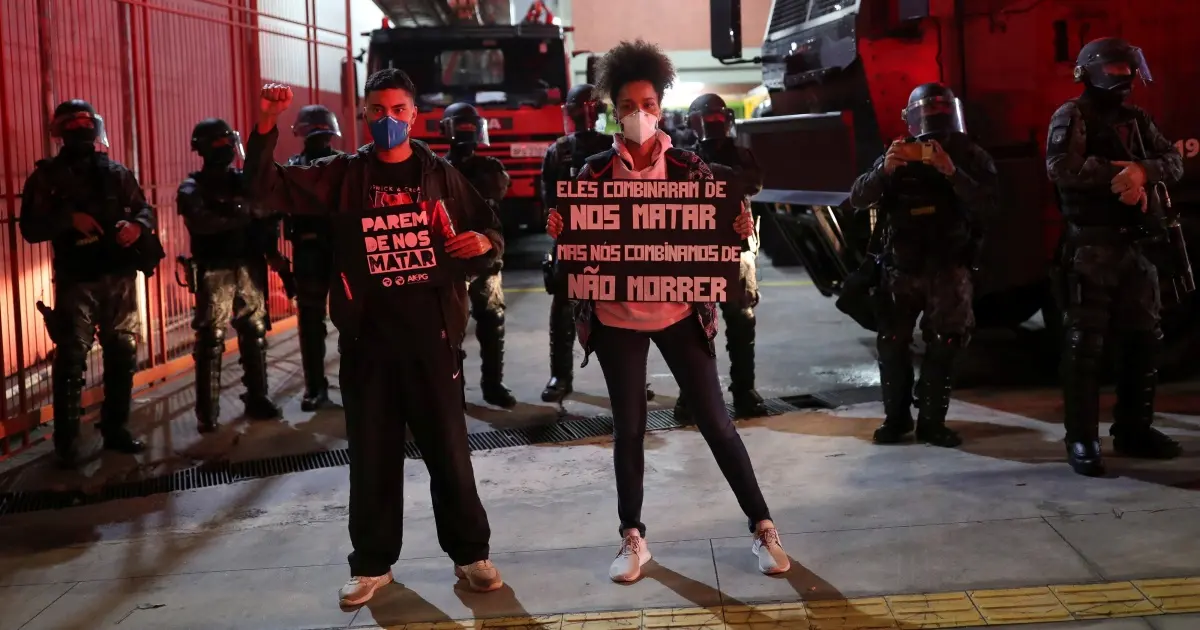Rio de Janeiro / Brasília — Massive demonstrations have erupted across Brazil in response to a police operation in Rio de Janeiro’s favelas that left over a hundred people dead. The scale of the protest underscores a deeply rooted crisis over race, policing, and inequality.
The Spark: A Deadly Police Operation
The protests were triggered by a large-scale raid carried out by more than 2,500 officers in Rio’s low-income neighborhoods. Officials say the operation targeted a notorious criminal organization, but critics immediately called it a massacre. According to survivors and local rights groups, many of the victims were civilians — mostly Black and poor — and the use of force was disproportionate and indiscriminate.
Residents of the favelas have long accused the police of treating their communities like war zones, and this raid has reignited longstanding grievances about militarized law enforcement and systemic violence. Witnesses reported scenes of chaos: bodies left in the streets, families demanding answers, and a public outcry following shocking images of brutality.
Protests Spread Across the Country
In the wake of the raid, thousands of people took to the streets in multiple cities, demanding accountability, justice, and an end to militarized policing in marginalized areas.
- In Rio de Janeiro’s favelas, demonstrators dressed in white carried banners denouncing “genocide” and called on state authorities to investigate the raid.
- Activists pressed for the resignation of local leadership, including the governor, whom they held responsible for authorizing the operation.
- Civil society groups, human rights defenders, and religious organizations added their voices to the protests, demanding full transparency, independent oversight, and reparations for the families of the deceased.
Allegations of Racial Violence and Structural Racism
Human rights organizations have condemned the operation as not only a failure of public security policy but also an act of systemic racism. According to these critics, Black Brazilians and residents of economically disadvantaged areas are disproportionately targeted in violent raids — a pattern repeated over decades.
Some of the key concerns raised include:
- Excessive Force and Executions
Reports indicate that police may have used lethal force even when nonviolent resistance by residents was possible. There are allegations of extrajudicial killings, as well as insufficient support for those wounded during the operation. - Impunity and Lack of Accountability
Residents and rights groups fear that without an independent investigation, those responsible will not face consequences. Calls for international oversight and thorough judicial inquiries are growing louder. - Racial Disparities in Policing
The majority of those killed are from Black and mixed-race communities, reinforcing long-standing accusations that Brazil’s security policies disproportionately harm marginalized racial groups.
Political and Social Fallout
The political repercussions are already mounting. President Luiz Inácio Lula da Silva has faced an uncomfortable balancing act: acknowledging the severity of the violence while arguing for effective crime control. Meanwhile, opposition leaders are leveraging the unrest to criticize both the state and the federal government.
Religious leaders have also weighed in, pushing for transformative justice and systemic reform. Their call: address not only the immediate violence, but also the structural racism embedded in Brazil’s institutions.
Some church groups are calling for broad reforms across policing, economic policy, and social investment — aligning with broader national demands that Black Brazilians be granted meaningful protection and equal rights.
What’s at Stake
- Justice and Transparency: Activists demand a real, independent investigation into the raid and the deaths.
- Police Reform: Many believe the current model of militarized policing must be replaced with a system that prioritizes human rights and community trust.
- Racial Equity: The protests are forcing Brazil to confront uncomfortable truths about race, inequality, and the legacy of colonial and racist violence.
- Social and Political Stability: How the government responds will shape Brazil’s future — in terms of trust in institutions, social cohesion, and the legitimacy of its justice system.
The Road Ahead
In the coming days and weeks, protesters are expected to maintain pressure on both state and federal authorities. Human rights groups are calling for a commission — potentially with international participation — to investigate the raid thoroughly. At the same time, social movements are organizing to push for deeper reforms, including demilitarization of the police and stronger racial protections.
Brazil now faces a critical test: whether it will confront systemic racism and transform its security policies, or double down on the militarized tactics that many believe have failed its most vulnerable citizens.
















Leave a Reply